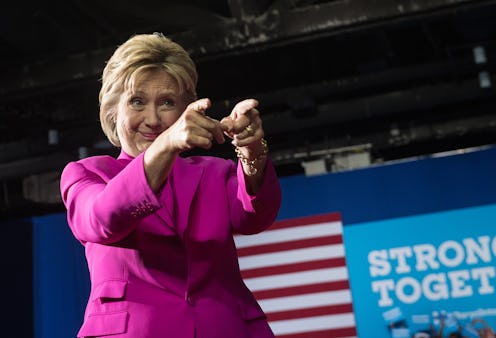News
Hillary Clinton Scored A Big Boost In A Key State
The highest court in the land issued a decision Wednesday that could affect the outcome of the November election. In a split decision, the justices refused to allow a controversial 2013 voting law in North Carolina to take effect before the big election day. North Carolina could well emerge as a key swing state in the presidential election, and in issuing its decision Wednesday, the Supreme Court has boosted Hillary Clinton's chances of winning the presidency in November.
The North Carolina legislature passed a restrictive voting law in 2013 that eliminated same-day voter registration and out-of-precinct voting, reduced the number of days for early voting, and required North Carolinians to show photo ID before casting a vote. In July, however, a federal appeals blocked the law from taking effect, finding not only that it was racially discriminatory, but that it had been enacted with the explicit goal of disenfranchising the state's black voters, the Fourth Circuit Court of Appeals claimed.
North Carolina appealed that decision, asking SCOTUS to allow the law to stand. That's the case that the court ruled on Wednesday. The court, which has only had eight justices since the death of Antonin Scalia, came to a split 4-4 decision — and in the event of a tie, the law reverts to the lower court's ruling. As a result, North Carolina's voter restrictions will not be in effect on election day this year.
This ruling is great news for Clinton, as well as every other Democrat who will be on the ticket in North Carolina in November. When Judge Diana Gribbon Motz struck down the law in July, she did so in part after determining that it would disproportionately affect would-be Democratic voters moreso than Republican ones.
"In North Carolina, restriction of voting mechanisms and procedures that most heavily affect African Americans will predictably redound to the benefit of one political party and to the disadvantage of the other," Motz wrote. "[T]he State's very justification for a challenged statute hinges explicitly on race—specifically its concern that African Americans, who had overwhelmingly voted for Democrats, had too much access to the franchise."
North Carolina isn't alone here. Throughout July, courts struck down other restrictive voting laws in Texas, Wisconsin, Kansas and North Dakota. All of these decisions matter, of course, but the ruling in North Carolina is especially important with regard to the presidential election.
North Carolina is a swing state — it's one of only two that voted for Barack Obama in 2008 but Mitt Romney in 2012 (Indiana is the other). According to FiveThirtyEight's polls-only forecast, Clinton currently has a 57.1 percent chance of winning in North Carolina, so the state is by no means a lock for her. What's more, it could be critical in November: According to The New York Times, North Carolina is one of eight states with a non-trivial chance of determining the winner of the presidential election.
In other words, both Clinton and Donald Trump will be competing for every last vote in North Carolina. The court's decision Wednesday may only have a small impact on the state's vote totals — but in North Carolina this year, even a small impact could have big ramifications.
